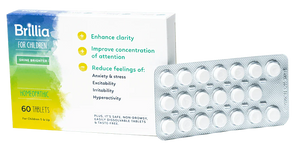Nearly 20 years ago, when a friend was told by her doctor that she needed to cut gluten out of her diet because she had Celiac disease, we both balked at such a crazy concept. Ten years later nutrition clients were asking me if gluten was the culprit in their diet and if they should eliminate it to improve their health. Now, going gluten-free is one of the biggest health trends, with one in five people eschewing gluten products from their diets. Does this protein have anything to do with our mental states? And could it be contributing to your child's anxiety? Let's find out.
What Is Gluten?
Gluten is a protein found in certain grains. It's in rye and barley, but as a society we don't consume much of those, so that's not too big a deal. The main grain known for having a substantial gluten content is wheat, and Americans eat a whole lot of that. In fact, we average about 135 pounds of wheat per year per person! That makes intolerance to it a potentially huge problem.
What Does “Gluten Intolerance” Mean and Is It the Same Thing as Celiac Disease?
Gluten intolerance and Celiac disease are two different things, even though they both signify that gluten doesn't work well for your body. Non-Celiac gluten sensitivity means that your system has difficulties digesting gluten, but there is no test for it. It is not an autoimmune condition, but rather a food sensitivity. Conversely, Celiac is an autoimmune disease and testing (usually via intestinal biopsy) can clearly diagnose whether or not someone has the disease. It's estimated that about 1 percent of the population has Celiac.
Can Gluten Cause Anxiety?
Whether you're dealing with gluten intolerance or Celiac, the problem has likely been present for a long time. Because Celiac is genetic, it may have been present since birth, which is quite a while even for a small child! Wheat is considered an inflammatory grain, meaning that it contributes to inflammation in the body. That can cause a host of problems, ranging from joint pain to emotional difficulties.
Inflammation impacts mental health because our mental health stems from our guts: the bulk of serotonin, the chemical that enables us to be happy, is created in our intestines and the brain. If your intestines are inflamed, normal production is inhibited. Inflammation is the main reason that many health practitioners suggest avoiding gluten (as well as sugar, another inflammatory food) whether or not your body has an issue with it.
Eating a food that you are intolerant to can lead to long-term damage to the intestines. In the case of Celiac disease, villi — the little tentacles on your intestinal walls that help your body absorb nutrients — become damaged and shrink as part of the autoimmune reaction to gluten. The result of villi shrinking is lack of nutrient absorption no matter what you eat. It can take years of eating gluten-free before they grow back in full.
When gut integrity is compromised, it's difficult to not suffer from mental health issues— including anxiety — as the body can't regulate the chemicals needed for well-being. The more that you learn about gluten intolerance and anxiety in children, the quicker you can look into resolving anxiety that may be exacerbated by gluten.
Will Going Gluten-Free Fix Anxiety?
There is no surefire 100 percent cure for childhood anxiety. From controlled screen time to mindfulness, it's important to manage emotional wellness comprehensively — but nutrition plays a large part in that, especially if your child is eating a food that doesn't agree with her body. Going gluten-free has been proven to reduce anxiety symptoms.
The simplest way to find out if gluten is a problem is to do a trial time of removing gluten from your child's diet. If her anxiety decreases, it may be worth having the test for Celiac done. This is because Celiac often leads to other autoimmune diseases, so you should be aware if your child has it. If removing gluten doesn't lower her anxiety, the Celiac test is not relevant.
We're fortunate that gluten sensitivities are more known now — and even more fortunate that there are so many healthful gluten-free foods in existence, it's possible to eat well without wheat!
Get a whole bunch of support right in your inbox.
References 1. https://www.webmd.com/digestive-disorders/celiac-disease/news/20160916/whats-behind-gluten-free-trend#1 2. https://www.statista.com/statistics/184084/per-capita-consumption-of-wheat-flour-in-the-us-since-2000/ 3. https://gluten.org/resources/getting-started/celiac-disease-non-celiac-sensitivity-or-wheat-allergy-what-is-the-difference/ 4. https://discoverbrillia.com/pages/five-pillars 5. https://discoverbrillia.com/pages/five-pillars-nutrition 6. https://www.dovepress.com/neuropsychiatric-symptoms-and-celiac-disease-peer-reviewed-article-NDT







